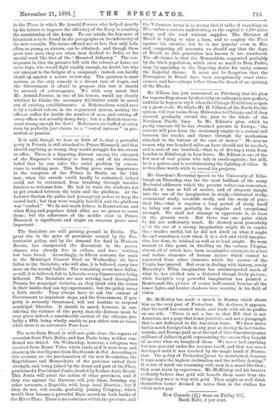Mr. Goschen's Rectorial speech to the University of Edin- burgh
on Thursday, was far the most brilliant of the many Rectorial addresses which the present writer can remember. Indeed, it was so full of matter, and of eloquent insight into the use of the imagination in study,—historical study, economical study, scientific study, and the study of prac- tical life,—that it requires a long period of study itself to bring out even partially its singular and exceptional strength. We shall not attempt to appreciate it, at least in the present week. But there was one point which he did not sufficiently touch. He showed most powerfully wilat the use of a strong imagination might do to render the.e studies useful, but he did not dwell on what it might do, and sometimes, even when it is a rich and vivid imagina- tion, has done, to mislead as well as to lead aright. He went nearest to this point, in dwelling on the various Utopias, almost all of which have been imaginative attempts to select and isolate elements of human nature which cannot be separated from other elements which the creator of the Utopia has ignored. But even in dealing with history, surely Macaulay's Whig imagination has misinterpreted much of what he has vivified into a distorted though lively picture ; while Carlyle's very powerful imagination has painted a Rembrandt-like picture of scenes half-unreal, because all the lesser lights and fainter shadows were wanting in his field of vision.


















































 Previous page
Previous page